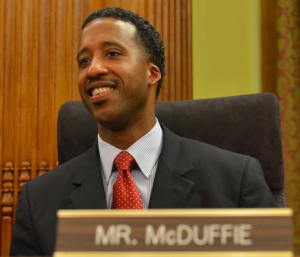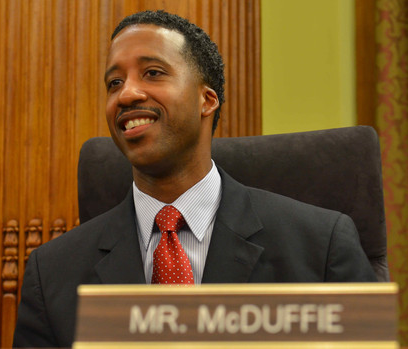
Councilmember Kenyan McDuffie (D-Ward 5) is the primary sponsor of an act that offers social solutions to violent crime.
The Council of the District of Columbia is currently considering the Neighborhood Engagement Achieves Results Act, which would attempt to reduce violent crime by approaching it as an issue of public health, instead of increasing police presence.
The bill was initially introduced at the first council meeting of the 2015-16 legislative year Sept. 22.
Nearly 70 public witnesses, the Metropolitan Police Department Chief, the Deputy Mayor for Public Safety and the Justice and Department of Health Director testified before the council’s Committee on the Judiciary and 11 of the council’s 13 members.
Councilmember Kenyan McDuffie (D-Ward 5), the bill’s primary sponsor, presented the major goals of the bill at the meeting.
“We have to recalibrate how we look at public safety, which means we have to address not just the symptoms of violent crime but also look to prevent and treat the root causes of violent crime in a long-term, sustainable way,” McDuffie said. “What’s clear is that we cannot arrest our way out of this problem.”
The bill has five specific goals, the most significant of which would establish an Office on Neighborhood Engagement and Safety. This office would identify 50 local individuals who are particularly at risk of committing a violent crime based on past criminal records and guide them through various forms of cognitive-based therapy to discourage future criminal activity.
In a forum on public health held Sept. 16, Councilmember Charles Allen (D-Ward 6), former policy director of the D.C. Primary Care Association, also supported a health-centered approach to reducing violence.
“That’s my background — in public health — and in public health you don’t just diagnose and have one prescription and that’s it,” Allen said. “It’s a very community-based model of how you go about impacting not just a person but a community.”
Another goal of the bill is to establish an Office of Violence Prevention through the Department of Health. This office would be charged with using resources through the Department of Human Services to combat the public health factors such as addiction and mental illness that often lead to violence.
At the forum, Nesbitt described key triggers for future violent tendencies, including past experiences with bullying or neglect, self-esteem issues, academic history and interpersonal skills.
The Act would also address new methods of local policing through the Metropolitan Police Department. The MPD would work with the Department of Behavioral Health and the Department of Human Services to make social workers and counselors more available to those who are impacted by violent crime. Officers would also undergo further annual training on the use of force in arrests and the prevention of biased-based policing.
MPD Chief Cathy Lanier highlighted local law enforcement’s support of the bill in the council meeting.
“Members of the community, no matter where you live, want to be part of the change,” Lanier said. “They are tired of upticks or spikes in violence at any time and they want to be part of the solution. And we feel that in MPD.”
The MPD would also be responsible for collecting more data from “stop-and-frisk” searches and on the use of force in arrests. This includes determining whether or not the search was consensual and if police seized any property. The gender and race of the individual stopped will also be recorded.
Additionally, the bill would amend the current Office of Police Complaints. This office would monitor the impact of citizen complaints more closely, including documenting details such as the discharge of any firearm that resulted in injury during an arrest.
“We also know that measures that make the police department more transparent lead to increased community trust, a key element in the effectiveness of any community policing strategy,” McDuffie said at the council meeting.
Finally, the Act would award the deputy mayor of public safety and justice grant-making authority, which could simplify the process by which grassroots crime prevention organizations receive funding. In doing so, McDuffie and his fellow co-sponsors are hoping to encourage sustainable crime prevention at the neighborhood level.
While violent crime is rare on Georgetown’s campus, Chief of Georgetown University Police Department Jay Gruber said the involvement of public services in policing is an important step toward safety.
“I think it’s great, I think it’s not just up to the police,” Gruber said. “It’s not just up to the criminal justice system to try to reduce crimes and violence. I think that there needs to be a more holistic approach and getting all of these different government agencies together to look at the problem in a different way will be very helpful.”
The bill is under review in the Committee on Health and Human Services and Committee on Judiciary and will face a vote in the next few months.





















